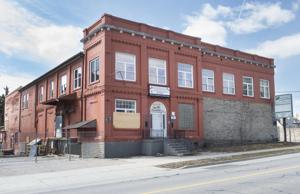Just a kilometre up the road from the sprawling site that housed the Schneiders meat processing plant for nearly a century stands an older vestige of the company’s past. The two-storey red brick building at in Kitchener was home to J.M.
Schneider’s butcher business from about 1909 to 1925, when it moved to the larger Courtland Avenue plant. Now, a developer is proposing to retain part of the building in a residential redevelopment of the property, while tearing down portions of it and two other buildings at the site. The plan raised some questions when it was presented for feedback at a recent Heritage Kitchener meeting.

The property is listed as a non-designated property of cultural heritage interest or value on the city’s municipal heritage register. Planning staff are still reviewing a heritage impact assessment prepared for the developer, Cantiro; a notice of intention to demolish parts of the site would have to be brought to Heritage Kitchener and council. Another heritage impact assessment would also come to the committee once a development concept has been finalized, said city heritage planner Deeksha Choudhry.
Design proposals are in the early stages, but could range from a townhouse project up to an eight-storey building under the permitted zoning, Cantiro’s Stewart Fraser said. Cantiro is at 45-53 Courtland Ave. E.
If the retained portion of the main building at 63 Courtland meets the criteria for designation under the Ontario Heritage Act, that’s typically required as part of the planning application, Choudhry said. The main building started off as a single-storey addition to an earlier building that was demolished between 1909 and 1914, the heritage assessment said. Several expansions, including the addition of a second storey, enlarged the main building to what’s seen today.
The assessment determined that demolishing more than half of the main building — as well as a second building built between 1917 and 1925, and a third, built after Schneider had moved — would not have significant adverse heritage impacts. “We’re proposing to save those parts of the buildings that are of heritage value,” said Vanessa Hicks, a heritage planner with MHBC, working on Cantiro’s behalf. “We’re fully aware of the significance of the Schneider family to the community, and we want to make sure that our development strategy for this site integrates and celebrates that history,” added Fraser.
Some Heritage Kitchener members suggested adaptive reuse, as opposed to demolition, for buildings on the site, and said the overall property may have more heritage value than the assessment concluded, especially as part of the broader Cedar Hill Neighbourhood Cultural Heritage Landscape. Cantiro proposes to initially keep a larger portion of the main building than will ultimately be saved until redevelopment plans are further along. “We recognize that if we remove too much of that building, and if the development is stalled for some reason, we’re looking to still have a viable building envelope,” said Hicks.
Tearing down the structures that Cantiro doesn’t want to retain will help address ongoing site security issues, Fraser said. Committee member Peter Ciuciura said he’s concerned that demolition could proceed before design concepts are finalized. “The greater the gap between the final design and the application for demolition, I think, leaves a greater set of questions .
.. on whether that demolition is valid in relation to what’s going to go on the rest of the site,” he said.
Committee chair Jean Haalboom also said she wished the heritage assessment delved further into the site’s later use by London-based Silverwood Dairies, which operated at the Courtland Avenue property for decades beginning in the late 1920s. It was used by other small businesses in more recent years. The site of the later Schneiders plant at Courtland and Borden avenues, which closed in 2015, is being redeveloped by Auburn Developments with a and nearly 4,000 residential units.
.
Top

Developer plans to retain part of early Schneiders factory in Kitchener residential project

The brick building stands just up the road from the company’s later complex, which is also being redeveloped.











